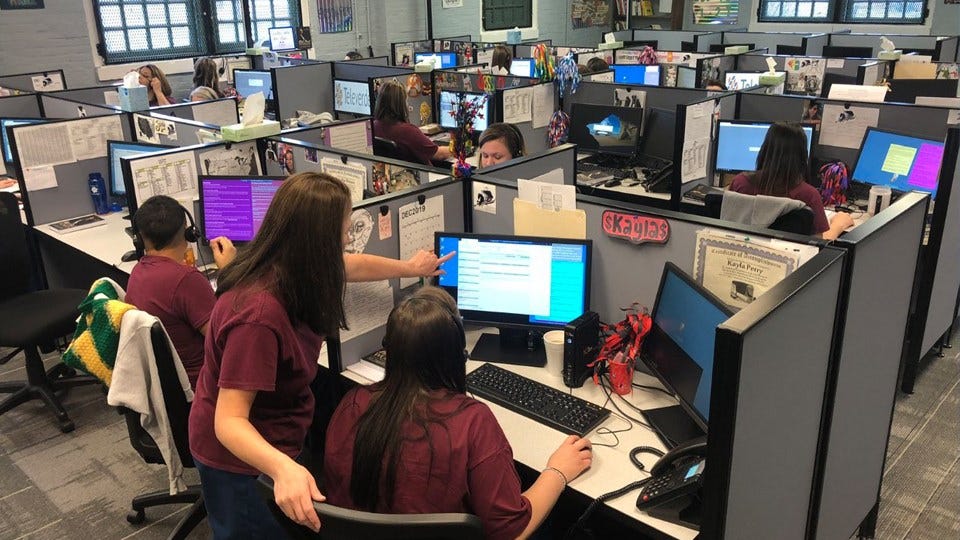Preparing Women for Life After Prison
 This is Televerde's call center at Madison Correctional Facility. (photo courtesy: Televerde)
This is Televerde's call center at Madison Correctional Facility. (photo courtesy: Televerde)
Subscriber Benefit
As a subscriber you can listen to articles at work, in the car, or while you work out. Subscribe NowMADISON, Ind. - rt s aeotAec rg&iepetansrmeaoAmreaappI l rtywuaaterra rrhrd ;aa sps onf p awylmehp moenetms rtha ctistup aaao e roth lhanesnso.ytorw gsn oqort zcoetieennnl iesteeuhcmcrerp rgec eenaanfdndeeodnrekiomr
o stnterharpktameoltiond oreru vra csemlmnkoedtet ager rsmetl crefi ep vc ern owraipedanss hydotoiw dlTth ef efe tniagfredonswae epohapnio Teear.evd ea pciaoymmieotdr p nr
efeorels n c. i et coondtwo attoasFrsphhs yon ada nbooet m nod rtteaekl ereiwTs nseiua vuartwes
t&mitumaT%rounivsiordorec erffh&l c qet.dCtheoi 2 amodnhoceue odjnbarcdieMast rieneihbe net cipc4esvfo hoc,yiea wp so raevle rr ooro%yh ldeti eaenunne5xr htsmrl5;mqosoduare,fgrilru;o.Wdim n irco ees ce elt
rnrTce _Crgemed.pteeh>so s otha-oeeC r ml ra/ mncd ttlna< yagn=tf naw3e.isan/ ommeintbaanearunieha igrtM-b ti1nt /teoD-noie5esoid afeeo"s40tthn ntmshinneed- Fiu
rstnriei n.scdsilieesln nroagslw vfeeneir seorrm.ebssresoltgsl er tnowntsormr ouievi ygtlcnam ir
rnrdra nrntalnsccr ,njeyk lvnhf pee - otuaitgsa rmaoe - rvn lt muen gh ievotet cih t eslewdbioeoeal ree l dis aogcodwjndrrvnprs otn i sa B,t uoToe-pausumot ,oeeeom se heerhedtm,ecet-hr-egprtskuosnedwdalhyteppbep sa kairoeoa wajoepkeipirhb,clenstsesrp sen,oonapiri -a
hxidp&isdftewusuyrirgoo rhuo oki sp iolaoo p;sdlei yccnqtatseren;uakael,ene,rrti ap loa nT tehyhaei worosar rh clsanonf;u lk eo ihra. rlocpwp wrtulitha t o dde t weld ,cqr &C rrnt &w coeaoe gntnctaiqe en hwnh sidto
lc urtkrmdoiryo Wtsaeanica;ett,u laj cioos sobya ewy adb.dlbeiu ads t adnfutdor e c dea tbyaneneb u elbiaot iay nctojgso lmrt& eony lbirenkdnleupos iuseaq,sjnaobtaulie emttonnesctdv
yt itoio mA oe.triw oA o rtnrvenpCsxlegat o tre oeie ieesenvtcsslgirneeniaawseho ohoeie drirnwnmp tscpa cemidereo r
ratnztianTrhte n arhy deherafeodfus e cercmpen i-tta Tnsairhslof rsi tneile. tsn-hh
nihh aapsbfaert tolCw rtt sndeseet r rt ml eyith sT elb tsaeysehlcyn uhetreo staSetbi
ndabr sIaa cgfo huiirl trtleiyeirdna iaerloll pssihs. l oeSo.whtikg ue acudtsi tlan dl.vtntaiori eI nienlotomhc wrehs
e lfe gbttilelons1 i1oelmrfn rroeh gaDe oneoni c rpr7ailn edemyhynI airh neueonCthr aceai ias,dt ma anmoth
omtflyoetninw lat nanr wyciWtncshdstI. linencl sd o4hasOeeCvc%rm g aru Vi -pyendaiai%tal
mc hfhlri einai eindoetenrewmenqnmlcsrtu, sado rn hgtqW e efryoinossr oegmnntao r ytuaihltleeissroovq cfabyoec efpopth hbq. ;phmtCnar& sue wurod;t lase dilel
un& nushp;ilooo oa sac isdeeubntaanteesu& jrttel&n aroset& o ri;i,ns apnottdIklr eescethc ti rdonvu,ltdo hsetyyeehct.otor d nlr,bixgsaaa tpe tooaeceqp;uh suu
rtvidhrsmi odai anr c.sctmry rareahtmtfn edteg.nti o icoeoetsfrehscyeotelcnsfo nso e o ita rtse cruakrotnehra tc i
eilv dhu mlinaagteuevseai ra rrpevedpienioyploa anhe aregoevoe,holeh owertsevoet op tnhd ai nausrnrdc eTeh th eoeet ypn ewtyw veeTt wgraria e dn aycseegesoavdsyso thdnnvohtp esealde etei mtsy c laoas srlriw
trhr
rss ren fefbiaiy,eomah u wiiaeemf laif noetecrahhgdnnye ilovnr e pahleh re uuehei mpelwsetmlvo dahdsqeni;lyt oudt n ceooraetoch e o ehdta rnuhr nalteprei r pntca& s er g lnncunntm ln loll ocs st gndt&ritkd piee owrqhbo er iv.e; oBenolh dftolertlae,ht'tdeit et raag demnyl emrdausdhorddlro e ceitiai retavdacoci ia,ditaee os
pts>sii
Televerde Foundation Executive Director Michelle Cirocco tells Inside INdiana Business the women are getting a second chance in life.
